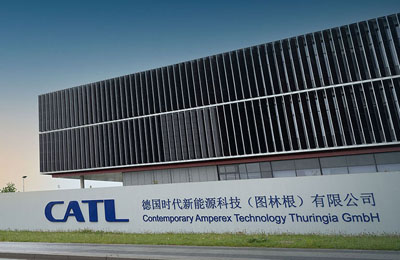U.S. Sen. Marco Rubio of Florida is calling for an investigation into Ford’s recent announcement of a new battery production facility built in conjunction with Chinese battery supplier CATL.
Ford has set its electrification targets high, aiming for a production run rate of 600,000 electric vehicles annually by the end of this year and 2 million EVs annually by the end of 2026. As part of this $50 billion electrification plan, Ford is building 10 new production facilities in the U.S., one of which---a battery production facility in Western Michigan---was announced Feb. 13.
Now the automaker is receiving backlash for partnering with CATL at the facility.
While Rubio has made the most comments on the upcoming Ford-CATL battery facility, going as far as demanding an investigation into the tech transfer within the deal, the controversy started at the announcement event Feb. 13. According to Reuters, President Joe Biden opted not to appear at the event, despite the audience of numerous other politicians and the fact Ford’s $3.5 billion facility will be one of the largest battery production facilities in the country.
Rubio’s office said in an emailed statement to Teslarati:
“I am alarmed at Ford’s plan to establish a large, Michigan-based factory, structured as a wholly owned subsidiary that licenses its technology from CATL. As such, I write to request a Committee on Foreign Investment in the United States (CFIUS) review of the licensing agreement, as well as demand that no federal funds---especially monies or tax credits granted via the Inflation Reduction Act (P.L. 117-169)---go to enrich PRC national champion CATL, or any other Beijing-supported company, directly or indirectly.”
Perhaps in an attempt to distance itself from the deal, no CATL representatives appeared at the event. Ford CEO Jim Farley briefly mentioned CATL's engineering prowess, but quickly moved on to focus on the technology Ford will be producing at the plant instead.
Ford was not immediately available to comment to Teslarati regarding the criticism.
As noted by Rubio, the controversy stems from the fact Ford will be receiving federal and state funds in the opening of this battery production facility. This could include anywhere from $20 to $50 per kWh of batteries produced thanks to the Inflation Reduction Act, on top of a $210 million grant from the State of Michigan.
Specifically, Rubio stated the Ford deal will result in higher dependence on the Chinese for battery production and battery technology, all while receiving American funds to do so.
South Korea is the default secondary option for automakers looking for battery suppliers outside China. General Motors has gone as far as creating a joint venture corporation, Ultium, with LG Chem. Ford has also partnered with SK On, another South Korean brand, to construct and produce batteries at a new facility in Kentucky.
It remains unclear if the federal government will intervene in the Ford-CATL deal, but there is no doubt Ford chose the least opportune time to partner with a Chinese supplier. Following this attention, it is improbable other automakers will look to partner with Chinese companies for their battery supply needs in the near future.










Abby Andrews